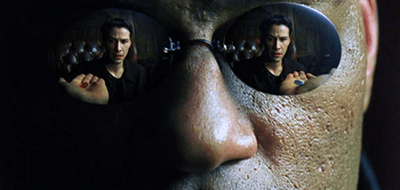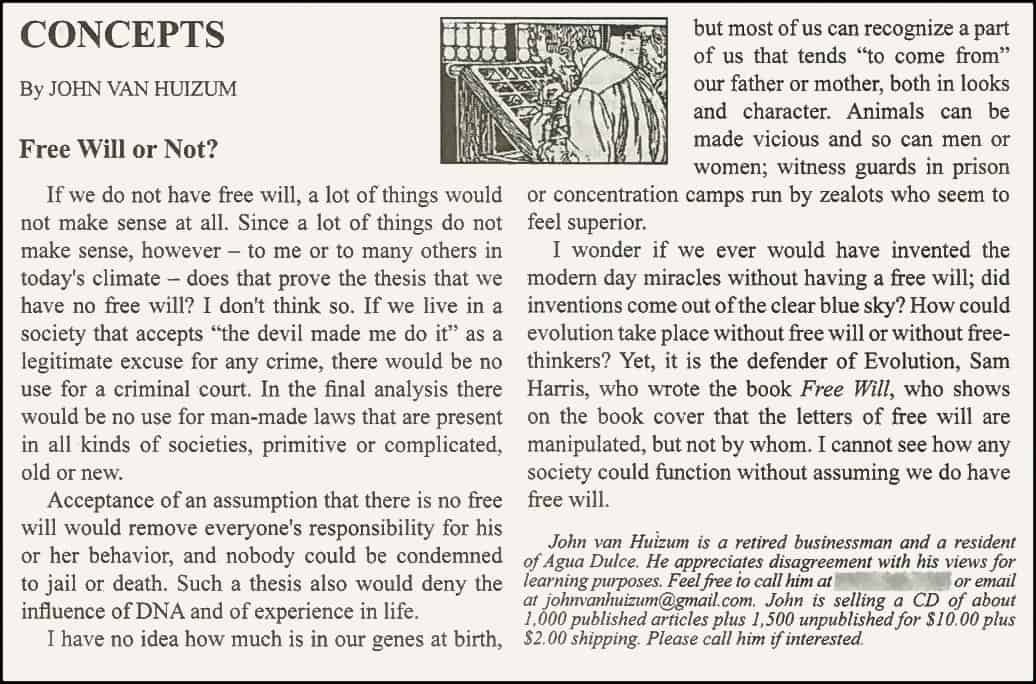I won’t get into the long back-and-forth that preceded this exchange. As much as I am confident it shows my own close attention to giants of thinkers that p[receded me as well as the clarity of the theistic position and the inherent implausibility and self-refuting nature of atheism… you can go to the discussion yourself and decide (you would have to be on FaceBook and “like” the group this took place in for the link to work).
Here Daniel said the following:
God being all powerful could have just as easily not created evil and permitted us free will. I am not able to imagine that which is impossible yet I still possess free will. Evil could have just as easy been one of the things I can not comprehend. Your argument is incredibly flawed.
[….]
Notice how I put came to be in “”. It’s simply referring to him being perfect from the get go from the beginning to forever. Never changing perfectly complete in every aspect. Never in need of anything.
I’m talking perfection not your flimsy anthropomorphic idea.
To which I respond in part:
He didn’t create evil. And in a previous post elsewhere you mentioned God coming into existence. You really should study the classical view of God (from Grecian times to ours). Maybe something like (I am struggling for something basic for you, because you seem not to be lifting with your legs on what I put down), Philosophy for Dummies, by Tom Morris. And, Christianity For Dummies, by Richard Wagner and Kurt Warner. [I didn’t mention this in the conversation, but the best intro to the topic of basic Christian beliefs is a book by theologian Wayne Grudem tiled “Bible Doctrine: Essential Teachings of the Christian Faith“]
Because you say stuff that paints a giant straw-man and this interferes with your conclusion.
- Mortimer J. Adler rightly points out that while many Christians are quick in responding to the conclusions in an argument often times the Christian is unaware that the point of departure is not in the conclusion, but in the starting premise, the foundational assumptions.
Norman L. Geisler & Peter Bocchino, Unshakeable Foundations: Contemporary Answers to Crucial Questions About the Christian Faith (Minneapolis: Bethany House, 2001), 20-21.
Daniel retorted with…
Again you are wrong. Hold on I’ll be back with the verse….Isaiah 45.7
- I form the light, and create darkness: I make peace, and create evil: I the LORD do all these things.
This verse, ISAIAH 45:7 — for context — reads:
- I form light and create darkness, I make well-being and create calamity, I am the Lord, who does all these things. (ESV)
- I form light and create darkness, I make success and create disaster; I, Yahweh, do all these things. (HCSB)
- The One forming light and creating darkness, Causing well-being and creating calamity; I am the Lord who does all these. (NASB)
- I form light and create darkness, I make harmonies and create discords. I, God, do all these things. (The Message)
Here is the Hebrew:
(Click to enlarge)
Note that Daniel used the KJV, whereas most versions since 1611 translate this word/thought (“and create evil“) better due to communication and modern access to many more manuscripts. Really, the context of the preceding verses should be included… you can read it here. I reference a previous discussion of this person [probably young man] coming at any ancient text with some parameters. He made it clear that his viewpoint is the only one that mattered (implicitly at least).
I responded
I will respond to the verse… it will offer you a great opportunity to be a literary critic… but first, here is a section from Philosophy for Dummies:
ROBOTS AND COSMIC PUPPETRY: THE SCIENTIFIC CHALLENGE TO FREEDOM
Since at least the time of Sir Isaac Newton, scientists and philosophers impressed by the march of science have offered a picture of human behavior that is not promising for a belief in freedom. All nature is viewed by them as one huge mechanism, with human beings serving as just parts of that giant machine. On this view, we live and think in accordance with the same laws and causes that move all other physical components of the universal mechanism.
According to these thinkers, everything that happens in nature has a cause. Suppose then that an event occurs, which, in context, is clearly a human action of the sort that we would normally call free. As an occurrence in this universe, it has a cause. But then that cause, in turn, has a cause. And that cause in turn has a cause, and so on, and so on [remember, reductionism].
- “Everything is determined, the beginning as well as the end, by forces over which we have no control. It is determined for the insect as well as for the star. Human beings, vegetables, or cosmic dust, we all dance to a mysterious tune, intoned in the distance by an invisible player” ~ Albert Einstein.
As a result of this scientific world view, we get the following picture:
- Natural conditions outside our control…
- cause…
- Inner bodily and brain states,
- which cause…
- mental and physical actions
But if this is true, then you are, ultimately, just a conduit or pipeline for chains of natural causation that reach far back into the past before your birth and continue far forward into the future after your death. You are not an originating cause of anything [this includes brain activity of all degrees, that is, love, pain, etc.). Nothing you ever do is due to your choices or thoughts alone. You are a puppet of nature. You are no more than a robot programmed by an unfeeling cosmos.
Psychologists talk about heredity and environment as responsible for everything you do. But then if they are, you aren’t. Does it follow that you can then do as you please, irresponsibly? Not at all. It only follows that you will do as nature and nurture please. But then, nature on this picture turns out to be just an illusory veil over a heartless, uncaring nature. You have what nature gives you. Nothing more, nothing less.
Where is human freedom in this picture? It doesn’t exist. It is one of our chief illusions. The natural belief in free will is just a monstrous falsehood. But we should not feel bad about holding on to this illusion until science corrects us. We can’t have helped it.
This reasoning is called The Challenge of Scientific Determinism. According to determinists, we are determined in every respect to do everything that we ever do.
This again is a serious challenge to human freedom. It is the reason that the early scientist Pierre Laplace (1749-1827) once said that if you could give a super-genius a total description of the universe at any given point in time, that being would be able to predict with certainty everything that would ever happen in the future relative to that moment, and retrodict with certainty anything that had ever happened in any moment before that described state. Nature, he believed, was that perfect machine. And we human beings were just cogs in the machine, deluded in our beliefs that we are free.
(Tom Morris, Philosophy for Dummies, 133-134)
Previously I noted his view of Consciousness was ill-placed:
What merit would attach to moral virtue if the acts that form such habitual tendencies and dispositions were not acts of free choice on the part of the individual who was in the process of acquiring moral virtue? Persons of vicious moral character would have their characters formed in a manner no different from the way in which the character of a morally virtuous person was formed—by acts entirely determined, and that could not have been otherwise by freedom of choice.
Mortimer J. Adler, Ten Philosophical Mistakes (New York, NY: Touchstone, 1985), 154.
At any rate, here is my response to Daniel’s verse he quoted most-probably from an atheist website:
A historian and critic of ancient literature would ask the following questions:
- Who was the writer?
- To whom were they writing?
- Is the choice of words, wording, or word order significant in this particular passage?
- What is the cultural, historical context?
- What was the author’s original intended meaning?
- How did the author’s contemporaries understand him?
- Why did he say it that way?
By doing this one shows a maturity level past taking a verse out of context. And again, you would want to give the benefit of doubt to the document [Aristotle and our court system] with the following:
1) Rule of Definition: Define the term or words being considered and then adhere to the defined meanings.
2) Rule of Usage: Don’t add meaning to established words and terms. Ask what was the common usage in the culture at that time period.
3) Rule of Context: Avoid using words out of context. Context must define terms and how words are used.
4) Rule of Historical background: Don’t separate interpretation from historical investigation.
5) Rule of Logic: Be certain that words as interpreted agree with the overall premise.
6) Rule of Precedent: Use the known and commonly accepted meanings of words, not obscure meanings for which there is no precedent.
7) Rule of Unity: Even though many documents may be used there must be a general unity among them.
8) Rule of Inference: Base conclusions on what is already known and proven or can be reasonably implied from all known facts.
[I discuss the above more in-depth here.]
So, for example, I will post one thought on the matter by CARM:
- “We can see that the Bible teaches that God is pure and does not approve of evil and that the word, rah (evil), in Hebrew can mean many things and that contextually the verse is speaking of calamity and distress. Therefore, God does not create evil in the moral sense but in the sense of disaster or calamity.”
And from Come Reason Ministries:
- “Evil means natural, and not moral evil, or sin. Herderson says ‘affliction, adversity’; Calvin, ‘afflictions, wars, and other adverse occurrences.’ Whichever interpretation may be adopted, none of the above texts, nor any others when properly explained, sanction the revolting proposition that God is the author of sin.”
Take hurricanes as an example. Hurricanes cause havoc, mayhem, and many times death and suffering. Yet, our planet would be dead without them (see my post where similar to you, arguments made against God end up being proof for Him.
So are you being thorough in your studies, knowing that which you refute? or are you being like the masses of uneducated voters/thinkers and just “willy nilly” taking stuff for granted and thinking you have a good argument?
Honorable mentions of resources on this verse:
Did God Create Evil – Does the Bible Say So? (Evidence for God):
Isaiah 45:7 contrasts opposites. Darkness is the opposite of light. However, evil is not the opposite of peace. The Hebrew word translated “peace” is shâlôm,2 which has many meanings, mostly related to the well being of individuals. Râ‛âh,3 the Hebrew word translated “evil” in the KJV often refers to adversity or calamity. There are two forms of the word. Strong’s H7451a most often refers to moral evil, whereas Strong’s H7451b (the form used here) most often refers to calamity or distress. Obviously, “calamity” is a better antonym of “peace” than “evil.”
Why does Isaiah 45:7 say that God created evil? (Got Questions?):
The context of Isaiah 45:7 makes it clear that something other than “bringing moral evil into existence” is in mind.
Here are a few commentaries on the verse[s]:
6. Comfort from Cyrus, God’s Anointed (Chap. 45)
45:1–6 The LORD calls Cyrus His “anointed” (the same word as “messiah” in Hebrew) because the Persian monarch was a prototype of the Messiah who would give final deliverance to His people. Jehovah promises to give him victory over nations, principally Babylon, to remove all hindrances to his conquests, and to hand over to him tremendous amounts of hidden riches in secret places. Still addressing Cyrus, the LORD speaks of Himself as the only true God, who calls Cyrus by name, who surnames him as anointed and shepherd (44:28), and who equips him for his mission. God does all this for the sake of His people, and so that the whole world may know that He alone is the LORD.
45:7 Verse 7 does not mean that God creates moral “evil,” as some have claimed, based on the King James Version and other early translations.
Delitzsch points out that the early “Christian” heretic Marcion, and the heretical Valentinians and other Gnostic sects, abused this text to teach that the God of the OT was “a different being from the God of the New.”
Addressing the problem of evil (including calamity, no doubt), Delitzsch continues, “Undoubtedly, evil as an act is not the direct working of God, but the spontaneous work of a creature endowed with freedom.”
- William MacDonald, Believer’s Bible Commentary: Old and New Testaments, ed. Arthur Farstad (Nashville: Thomas Nelson, 1995), 972.
45:5–7 The Lord’s Witness to Cyrus
In the first stanza (45:5–6a) and from this center-stage position, the Lord continues to address Cyrus with the word I am the LORD. Though Cyrus does not know the Lord (cf. 45:4), the Lord knows Cyrus and equips him. I am using the word equips to refer to all of the ways in which the Lord has strengthened Cyrus (45:1–4). The goal of that equipping was to set the Judean exiles free (45:13). The equipping of Cyrus takes place so that they may know … that there is no one besides me (45:6). It is not clear who they might be. The NIV substitutes the word men, meaning people in general. But this is conjecture. The more likely antecedent for they would be Jacob-Israel (45:4). But why would the Lord’s equipping of Cyrus make it possible for Jacob-Israel to know that there is no one besides the Lord? The answer lies at the end of 45:1–13. Cyrus will permit Jerusalem to be rebuilt; Cyrus will set the Judean exiles free (45:13). Jacob-Israel will know that the Lord has delegated power to Cyrus but that it is the LORD’s power that needs to be reckoned with.
The phrase I am the LORD opened the first stanza and now it opens the second (45:6b–7). This is followed by parallel lines describing the Lord as
forming light and creating darkness,
making peace and creating distress. (45:7 AT)
These lines employ language from Genesis 1 and 2 (forming, creating, making). In the second line the Lord lays claim to making peace as well as creating distress (ra‘). The Hebrew noun ra‘ has a range of meanings (cf. evil, KJV; disaster, NIV; woe, NRSV; calamity, JB). It is a mistake to elaborate a theology of God as the creator of evil from this text (see “Creating Evil” in TLC below).
The main point in the witness to Cyrus in 45:5–7 is the Lord’s singularity (no one else) and his activity (doing all these things). God’s power may be seen in creation and in history. God’s sovereignty is over Cyrus; Cyrus does not control God.
- Ivan D. Friesen, Isaiah, Believers Church Bible Commentary (Scottdale, PA; Waterloo, ON: Herald Press, 2009), 277.
45:5–7. Again the uniqueness of God is stressed. The fact that there is no other is stated in verses 5–6, 14, 18, 21–22 (also see 43:11; 44:6; 46:9). In Cyrus’ day the Lord was not universally acknowledged, but eventually He will be (cf. Phil. 2:10–11). People will realize that all that happens-light (life), darkness (death), prosperity, and disaster (not “evil” as in the KJV; cf. Amos 3:6)—comes from God. As the sovereign LORD of the universe He can do everything.
- John A. Martin, “Isaiah,” in The Bible Knowledge Commentary: An Exposition of the Scriptures, ed. J. F. Walvoord and R. B. Zuck, vol. 1 (Wheaton, IL: Victor Books, 1985), 1100.
CREATION OF THE UNIVERSE
Here is a remarkable statement relative to the creation of the universe before all time. God says:
I form the light, and create darkness: I make peace, and create evil, I the LORD do all these things [Isa. 45:7].
Zoroastrianism began in Persia. It teaches that Mazda is the god of light. God says He creates light, and that it is no god. The Persians were getting very close to the truth. Many have wondered why they worshiped one god in the midst of idolatry. Well, you must remember that they came in contact with the nation Israel, and Israel was a witness to the world. In Zoroastrianism darkness was Ahriman, the god of evil. God takes responsibility for creating the darkness also.
“And create evil”—the word evil does not mean wickedness in this instance, but rather “sorrow, difficulties, or tragedies”—those things which are the fruit of evil, the fruit of sin. This is the Old Testament way of saying, “The wages of sin is death …” (Rom. 6:23). If you indulge in sin, there will be a payday for it!
By the way, let me introduce something else at this point, since we are living in a day when it is said that good and evil are relative terms, that whatever you think is good, is good. The argument is put forth: The Bible says “Thou shalt not kill” and “Thou shalt not steal” (Exod. 20:13, 15). But what is the Bible? Who should obey it? Or why should we listen to the God of the Bible?
The Lord has another very cogent argument. God says that if you indulge in sin, you will find that sin has its payday. It pays a full wage, by the way. This is what God is saying through Isaiah. God has so created the universe that when you break over the bounds that He has set, you don’t need a judge, a hangman’s noose, or an electric chair; God will take care of it.
He says, therefore, that He is the One who creates light and darkness. He is answering Zoroastrianism which worshiped the god of light. God says, “I want you to know that light is no god; I created it.
- J. Vernon McGee, Thru the Bible Commentary: The Prophets (Isaiah 36-66), electronic ed., vol. 23 (Nashville: Thomas Nelson, 1991), 71–72.
ISAIAH 45:7—Is God the author of evil?
PROBLEM: According to this verse, God “creates good and evil” (KJV, cf. Jer. 18:11 and Lam. 3:38; Amos 3:6). But many other Scriptures inform us that God is not evil (1 John 1:5), cannot even look approvingly on evil (Hab. 1:13), and cannot even be tempted by evil (James 1:13).
SOLUTION: The Bible is clear that God is morally perfect (cf. Deut. 32:4; Matt. 5:48), and it is impossible for Him to sin (Heb. 6:18). At the same time, His absolute justice demands that He punish sin. This judgment takes both temporal and eternal forms (Matt. 25:41; Rev. 20:11–15). In its temporal form, the execution of God’s justice is sometimes called “evil” because it seems to be evil to those undergoing it (cf. Heb. 12:11). However, the Hebrew word for evil (rā) used here does not always mean moral evil. Indeed, the context indicates that it should be translated, as the NKJV and other modern translations do, as “calamity.” Thus, God is properly said to be the author of “evil” in this sense, but not in the moral sense—at least not directly.
Further, there is an indirect sense in which God is the author of moral evil. God created moral beings with free choice, and free choice is the origin of moral evil in the universe. So, ultimately God is responsible for making moral creatures who are responsible for moral evil. God made evil possible by creating free creatures, but the free creatures made evil actual. Of course, the possibility of evil (i.e., free choice) is itself a good thing. So, God created only good things, one of which was the power of free choice, and moral creatures produced the evil. However, God is the author of a moral universe and in this indirect and ultimate sense is the author of the possibility of evil. Of course, God only permitted evil, but does not promote it, and He will ultimately produce a greater good through it (cf. Gen. 50:20; Rev. 21–22).
The relation of God and evil can be summarized this way:
| GOD IS NOT THE AUTHOR OF EVIL In the sense of sin Moral evil Perversity Directly Actuality of evil |
GOD IS THE AUTHOR OF EVIL In the sense of calamity Non-moral evil Plagues Indirectly Possibility of evil |
- Norman L. Geisler and Thomas A. Howe, When Critics Ask: A Popular Handbook on Bible Difficulties (Wheaton, Ill.: Victor Books, 1992), 271–272.





